China’s statement denouncing the US for launching a trade war was refuted by the US think tank.
This article also quotes an American science and technology think tank that ranks first in the world, saying that China’s statement is seriously divorced from the facts, just like writing a novel, and lists how this American think tank refuted China’s official statement to pieces.
However, in Brother honest and frank’s view, this article, which has caused many "haters" to climax, especially the refutation of us by the American think tank, is full of loopholes and serious injuries … ..
Text:

Let’s first introduce this so-called "No.1 in the world" science and technology think tank. It is called "American Information Technology and Innovation Foundation" (ITIF for short), and its chairman is robert Atkinson. It has served as a consultant in the fields of trade and scientific and technological innovation in former US presidents Obama, Clinton and George W. Bush.
Therefore, when such a figure jumps out to criticize China, the people who eat melons will naturally be intimidated by his title and resume, and it is easy to listen to his story.
What’s more, this Mr. Atkinson has been publishing articles and reports that criticize China’s trade behavior "systematically" since a long time ago, such as Enough: Facing China’s New Mercantilism in 2012 and False Commitment: The Great Gap between China’s Commitment to the WTO and Reality in 2015.
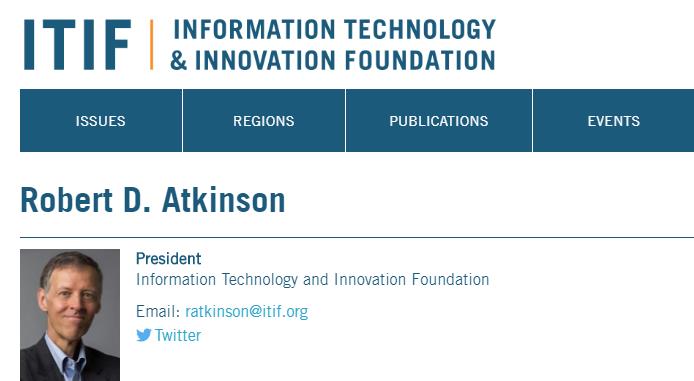
What is mentioned in the popular article in the WeChat circle of friends today is an article that he specially wrote to "criticize" our statement one by one after the Ministry of Commerce issued a statement on the US trade war behavior.

But although Atkinson has painstakingly coded more than 1000 words to criticize the statement of our government, his refutation is full of all kinds of rhetoric traps such as "stealing concepts", "logic inversion", "selective blindness" and even "making things up".
Let’s talk about it one by one:
【1】
In the first article of its statement, China’s Ministry of Commerce accused the US of "fabricating a whole set of distorted truth about Sino-US economic and trade relations" under the pretext of "suppressing China’s development for domestic political needs". Atkinson’s refutation is that China did not give a satisfactory answer to a series of allegations in the official statement of the United States and his own article "Enough: We must face China’s new mercantilism" published in 2012. (The original words are "China has yet to satisfactorily responded to all of the claim")

However, the problem is that the accusations against China in the US 301 Report and the accusations against China in Atkinson’s own report in 2012 are simply unrealistic "crooked theories" and have been criticized by us all the time, so how can we "satisfy" you with China’s reply?
Moreover, Atkinson’s 2012 report was refuted by scholars in China at the time of publication. Among them, Dr. Yang Zhihuang from Peking University, who works for the Ministry of Commerce, wrote "Confrontation of Confrontation — — Refuting the article "China’s innovative mercantilism" of American think tank, 1 vividly reveals that Atkinson knows that China is not "mercantilism" at all, so he invented a so-called "new mercantilism" by expounding in detail the aspects of "dollar hegemony", "China’s economic growth structure", "China’s family planning policy" and "China’s trade and foreign investment policy".
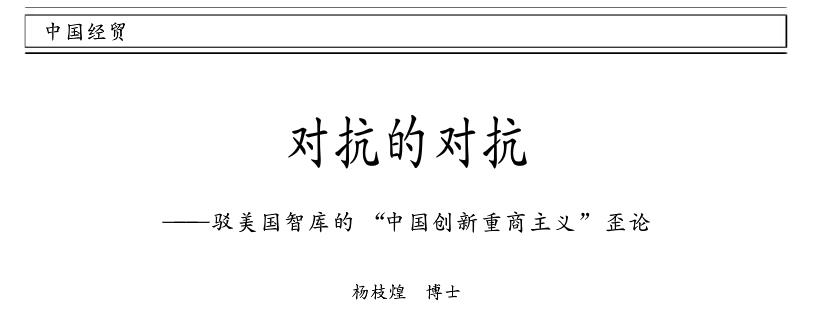
More importantly, the so-called huge "trade deficit" between China and the United States is the core reason for Trump’s trade war with China. This is also the basis for Trump to launch the 301 investigation and trade war against China, and it is clearly written in the "background" column of the US 301 investigation report.
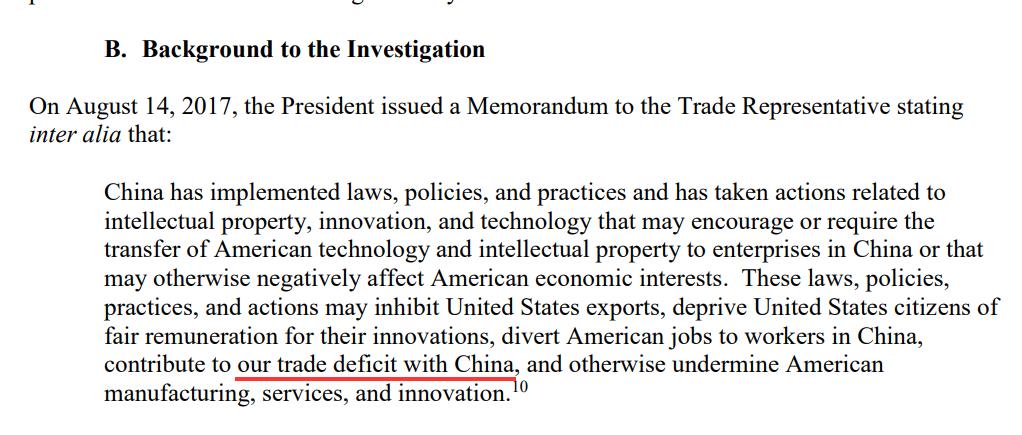
However, Trump’s obsession with the "trade deficit" has long been criticized by American media, scholars and think tanks, which is a very wrong practice, because it ignores the respective positions of China and the United States in the global industrial chain. For example, the Brookings Institution of the United States pointed out in an article that the added value of China’s products exported to the United States is actually very low, and it is harmful for the United States to engage in trade wars.
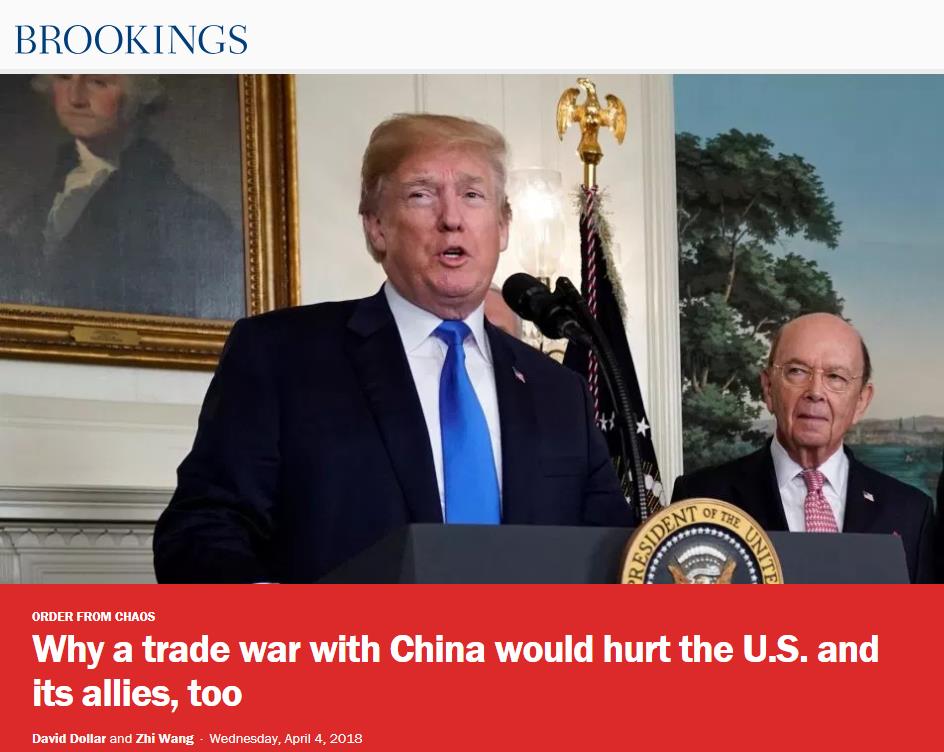
Therefore, we accuse the United States of "fabricating a set of policy logic that distorts the truth of Sino-US economic and trade relations for the purpose of domestic political needs and suppressing China’s development", and there is no problem.
【2】
In view of China’s Ministry of Commerce’s refutation of the US accusation of "mercantilism", that is, the success of China’s economy depends not on "mercantilism" but on "firmly promoting market-oriented reform and constantly expanding opening up", Atkinson criticized us and said, "What about your China enterprises taking money from the China government to buy American technology companies? This is not mercantilism? "

However, Atkinson obviously hasn’t read the Report on Overseas Sustainable Development of China Enterprises issued by the Ministry of Commerce and the State-owned Assets Supervision and Administration Commission. Because this annual report clearly shows that bank loans are the most important source of funds for overseas mergers and acquisitions of China enterprises, and these banks include both domestic banks and overseas banks.
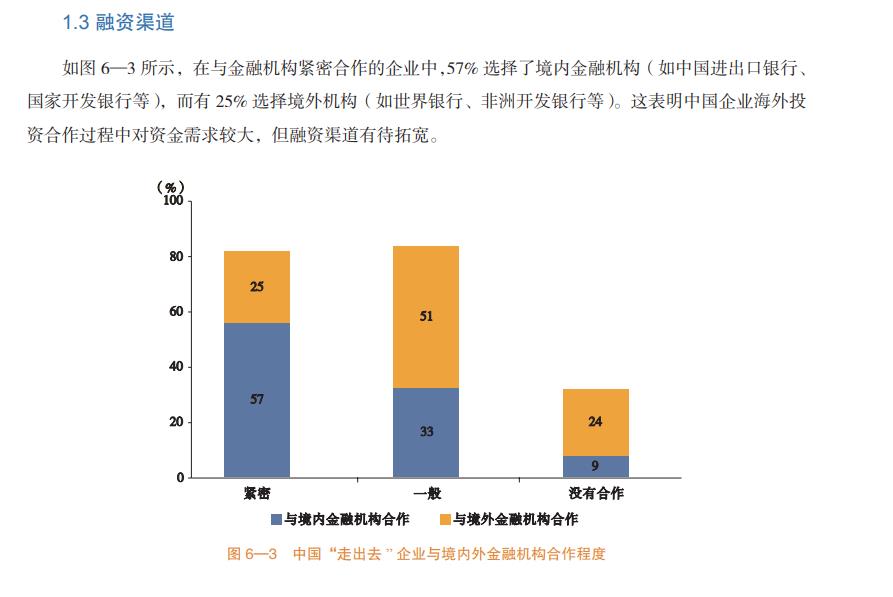
Another data further shows that in 2016, China Chemical acquired Swiss Syngenta for US$ 43 billion, that is, a consortium of 17 banks at home and abroad provided financing, with a bank loan amount of about US$ 33 billion; In the same year, Tencent acquired game developer Supercell for $8.6 billion, of which $3.5 billion was loans provided by many banks at home and abroad.
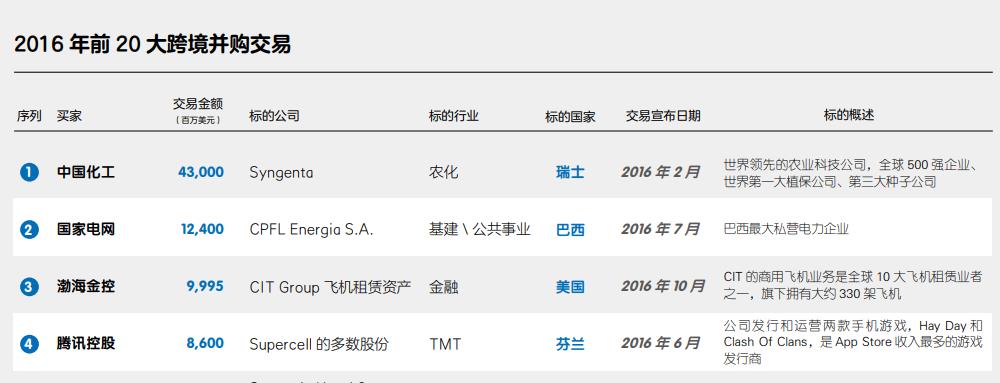
In addition, it is worth mentioning that the China Municipal Government actually does not encourage China enterprises to blindly engage in "mergers and acquisitions" abroad. On the one hand, it will increase financial risks, and on the other hand, it will have a negative impact on China’s foreign investment.
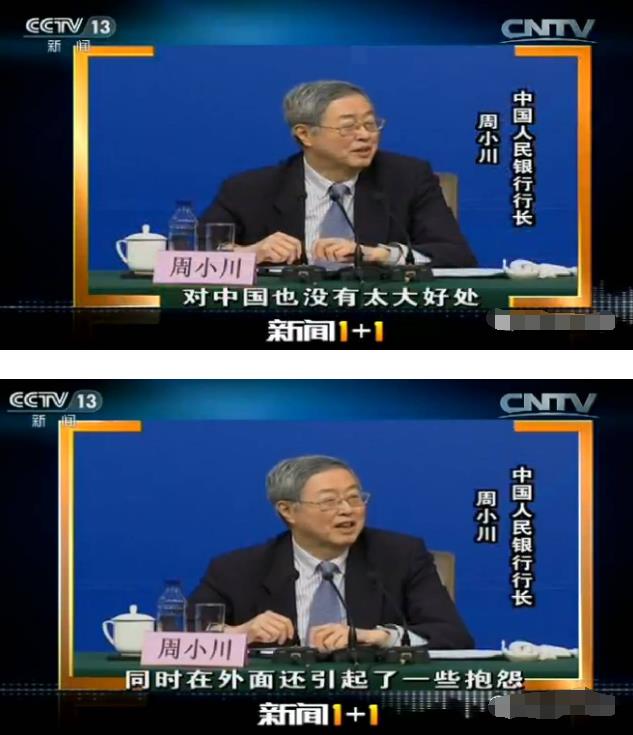
【3】
In response to my Ministry of Commerce’s accusation that "the US side imposed artificial restrictions on the export of high-tech products with comparative advantages out of the Cold War mentality", thus aggravating the US trade deficit with China, Atkinson retorted to the Ministry of Commerce that "your China administration pursues [import — Alternative] policy, and you also restrict the import of American semiconductors. "

Actually, brother honest and frank has to thank Mr. Atkinson for specifically mentioning the example of semiconductor. Because people who have long been concerned about the development of China’s semiconductor industry know very well that it was the Wassenaar Agreement, which was made by the United States and its allies in 1994 and was full of cold war meaning, which prohibited the export of modern international semiconductor equipment to China, which forced China to make efforts to develop its own industry, so as not to be strangled by the United States and lose the country’s independent ability.
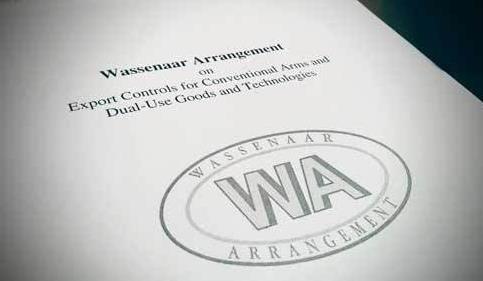
Therefore, Atkinson’s criticism of China confuses "cause" and "effect".
【4】
Regarding China’s Ministry of Commerce’s statement that China is constantly improving the legal system of intellectual property protection and promoting relevant trials to refute the US statement that China stole American intellectual property rights, Atkinson sarcastically said, "Is this the reason why Qualcomm, an American company, was found to have violated the anti-monopoly law only in your China court and was severely punished by $1 billion? And you also used this case in 2015 to force Qualcomm to sell its technology license at a low price, which is unique in the world. ".

In other words, what Atkinson means is that you in China are not protecting intellectual property rights at all, but infringing on and attacking American enterprises in the name of protection.
But Atkinson seems to forget that in January this year, the European Union also fined Qualcomm more than $1 billion for violating the anti-monopoly law, and in 2016, Qualcomm was fined more than $800 million by a Korean court.
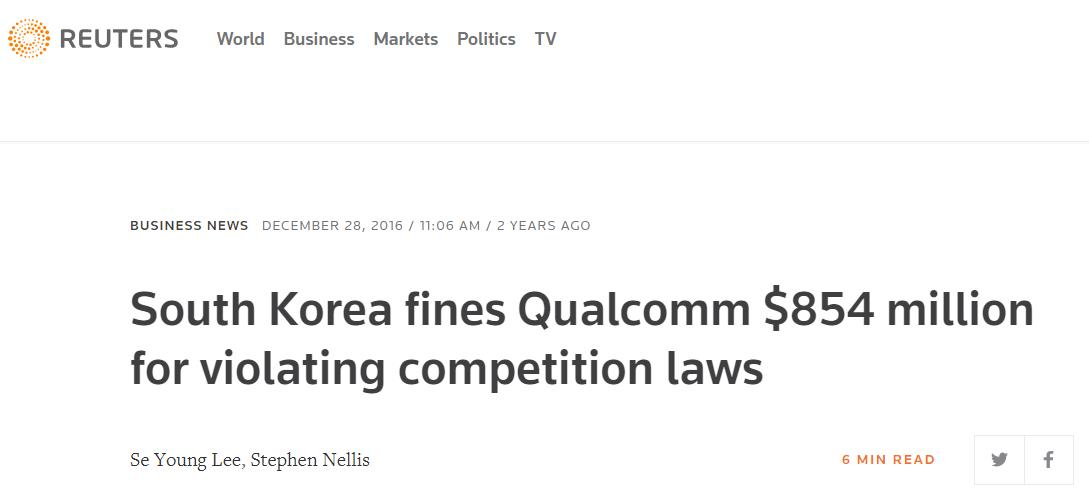
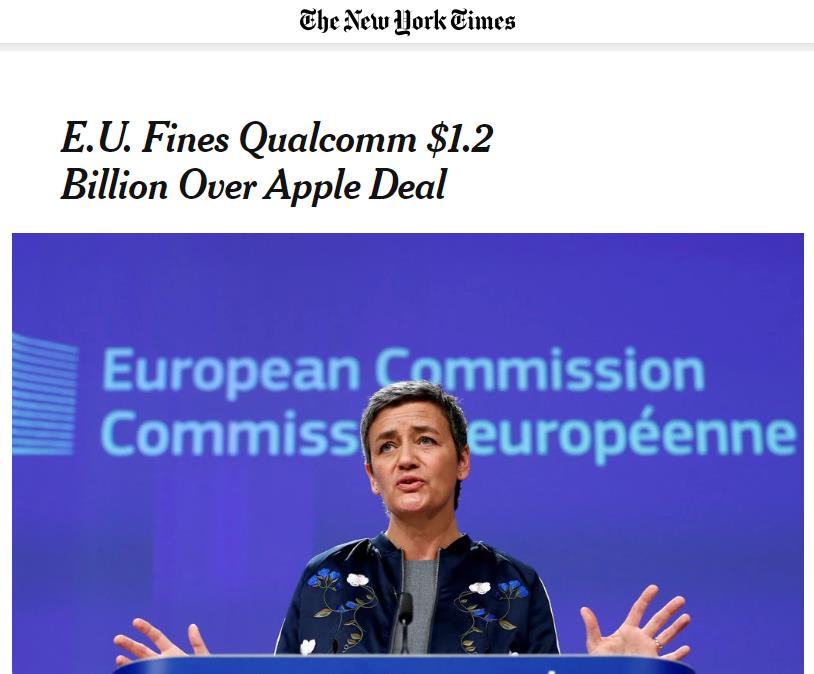
What is even more puzzling is that anti-monopoly and intellectual property protection are obviously two things. Why does Atkinson want to mix these two things? — — Could it be that "intellectual property protection" in Mr Atkinson’s eyes is to allow enterprises like Qualcomm to abuse their dominant market position?
In fact, in terms of intellectual property protection, China has indeed safeguarded the interests of the United States and Qualcomm. Last year, for example, a company named "Qualcomm" in Shanghai touched porcelain in Qualcomm, USA, and asked Qualcomm, USA to pay 100 million yuan for trademark infringement. In the end, Qualcomm not only won the case, but also Qualcomm was fined 10,000 yuan by Beijing Intellectual Property Court for forging evidence. 8。
【5】
In response to China’s Ministry of Commerce’s denial of China’s request for "compulsory technology transfer" to foreign-funded enterprises accused by the US, Atkinson’s attack was "how come an EU survey found that only 12% of foreign companies are willing to continue the current joint venture model if the relevant requirements for joint ventures in China are cancelled?"
Atkinson also claimed that many American economists knew that China had a policy of compulsory technology transfer. Although China didn’t require foreign companies to abide by it, it would be bad luck if they didn’t.

Of course, Atkinson’s statement itself is not new. After all, this is what the US government has been accusing China of for more than 10 years.
Moreover, it is not only the United States that "accuses" China of asking foreign companies to "force technology transfer". The survey conducted by the European Union in 2013 mentioned by Atkinson shows that the foreign-funded enterprises interviewed are generally dissatisfied with the requirements of the joint venture required by the laws of China, and only 12% of the enterprises interviewed said that they can accept the existing joint venture arrangements.
However, this dissatisfaction is mainly due to the restriction on the share ratio of the joint venture, that is, the foreign shareholding cannot exceed 50% at most. Among them, more than half of foreign companies indicated in this survey that they hope to own all the shares in the enterprise.
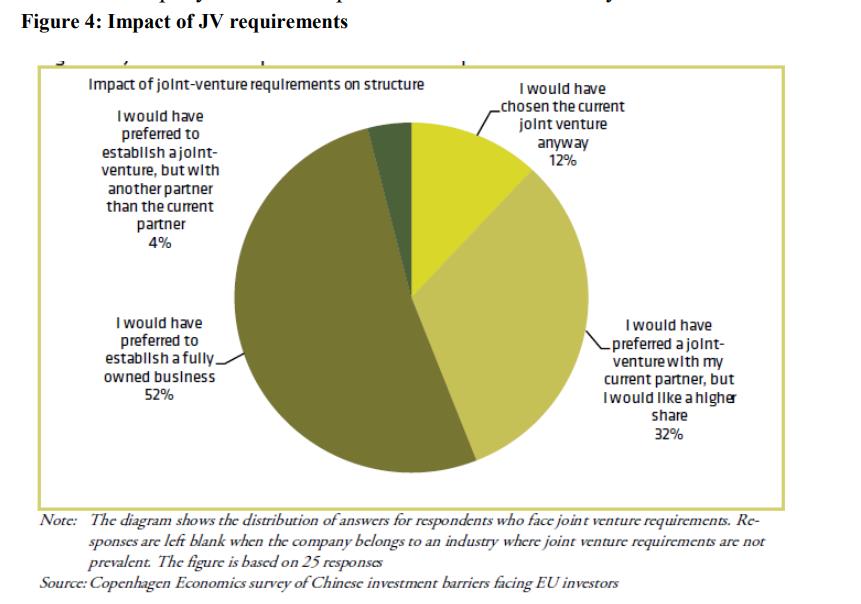
In fact, some foreign-funded enterprises are dissatisfied with the share ratio distribution of joint ventures in China, which is one of the main reasons why they constantly accuse China of "compulsory technology transfer" out of thin air. At the same time, the rapid rise of China, especially the progress in science and technology, has also made these enterprises feel that their advantages over China are gradually weakening, which has further aggravated their anxiety and intensified their clamour for "compulsory technology transfer".
However, as Wei Jianguo, the former vice minister of the Ministry of Commerce, said, this accusation is totally groundless, because China has never had any official laws and policies requiring foreign investors to transfer technology. China News Service also quoted professionals as saying in a report that there is only a "paid license for technology use" in China that will benefit foreign investors, but there is no law or policy requiring technology ownership transfer. It is "nonsense" to accuse China of compulsory technology transfer.

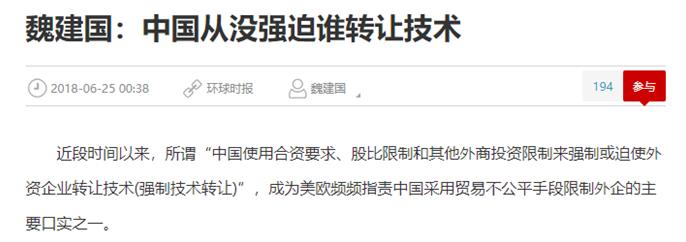
In addition, this year, the China government has relaxed the restrictions on the share ratio in joint ventures, so that foreign investors can have a decisive say in joint ventures. China also promised in "black and white" that the relevant share ratio restrictions will be lifted by 12% around 2021 and 2022.
【6】
In view of the statement that the industrial policies such as "Made in China 2025" put forward by the Ministry of Commerce of China are only guiding and leading policies under the market economy, and are also open to foreign investment, Atkinson retorts that "all the subsidies are given to enterprises in China, but not to the United States, so you are not guiding policies at all, but subsidizing China enterprises to attack American enterprises".

But Atkinson’s rebuttal seems to deliberately omit two messages: 1. The Ministry of Commerce still has such a half sentence in its reply about "Made in China 2025": "Ironically, the United States itself has a large number of subsidies in agriculture and manufacturing" 13; 2. Many government departments in China have repeatedly stated through the media that the policy of "Made in China 2025" will bring equal opportunities to foreign-funded enterprises.
For example, Xin Guobin, vice minister of the Ministry of Industry and Information Technology, said last year that China’s first domestic large aircraft C919 is a "model of cooperation between Chinese and foreign enterprises": its engines, avionics and flight control systems come from several European and American joint ventures or wholly-owned companies, and its suppliers include General Electric Company and Honeywell Company, among which there are more than a dozen overseas enterprises among the first-class suppliers, and there are about hundreds of second-class and third-class suppliers. Moreover, after the successful first flight of C919, GE made a special news announcement, stating that it participated in the China Large Aircraft Project 14.

【7】
In response to China’s Ministry of Commerce’s statement that China has been actively negotiating with the US on trade differences, instead of "ignoring it" as the US said, and the statement that the US started a trade war, Atkinson retorted that "you started a trade war in China more than 20 years ago, and Trump just responded, and in recent years, you in China have been constantly delaying and avoiding the questions raised by the US".
So don’t try to "grab the moral high ground", Atkinson said.

But Atkinson is actually "stealing the concept". As Brother honest and frank said earlier, the root cause of the Trump administration’s trade war against China is that he thinks there is a "huge trade deficit" between China and the United States, and the persistent trade differences between China and the United States are all aimed at narrowing the trade deficit.
At the same time, the "trade deficit" is also the main reason why Trump launched a trade war against several American allies at the same time.
Therefore, China’s Ministry of Commerce is right to say that the United States fired the first shot.
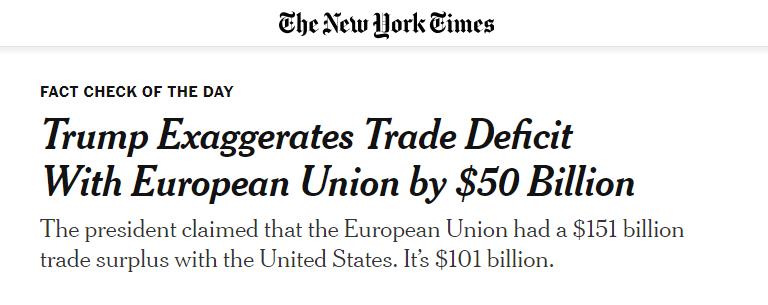
As for the trade disputes between China and the United States, before Trump came to power, the trade negotiations between the United States and China in the past few years actually managed to control these differences, and made gradual adjustments to each other on a rational basis. On the contrary, Trump broke this mode of cooperation as soon as he took office, threatening China and its allies with tariff sticks that American experts and think tanks and even Atkinson himself opposed, and his own negotiating team was even more confused, which had already been exposed by the American media for many times.
Therefore, our Ministry of Commerce is not wrong about trade differences and negotiations.
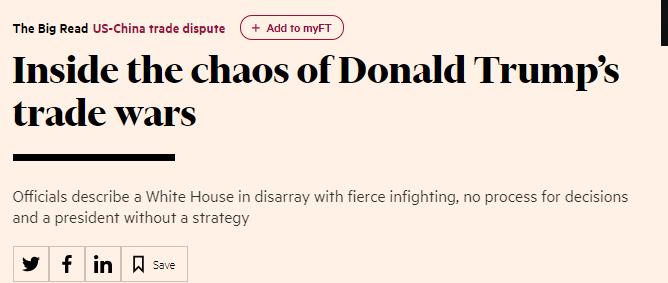
In addition, Brother honest and frank thinks that Mr. Atkinson should also make up the basic knowledge of "trade war", and then look at how many benefits Sino-US trade has brought to the United States in recent years. Finally, think about if China launched a trade war against the United States as early as 20 years ago, are these benefits for the United States blown by strong winds?
【8】
In response to the statement made by the Ministry of Commerce of China in the last paragraph that China will "continue to promote opening up, create an attractive investment environment, firmly support economic globalization, and firmly safeguard the international economic and trade system", Atkinson sarcastically said, "You said it well, but in fact you didn’t do it at all".
His reason is that he wrote a report in 2015 claiming that China has not fulfilled most of its commitments after its accession to the World Trade Organization.

However, after this report was published in 2015, it was immediately refuted by domestic scholars in China. Among them, Professor Cui Fan of university of international business and economics refuted the so-called unfulfilled promises of China listed in Atkinson’s report one by one.
Professor Cui even found that most of Atkinson’s accusations against China in the WTO were not only absurd, but also made up many nonexistent "commitments" of China’s accession to the WTO 17… …
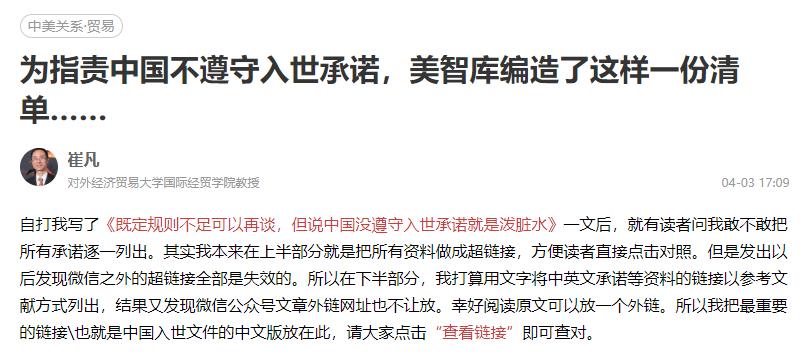
【8】
Finally, I believe that when you read this, you will find that although Atkinson and the "American Information Technology and Innovation Foundation" he founded do have certain authority in the United States, many of his viewpoints cannot withstand the cross-examination of evidence from China, and even many of his viewpoints are further exposed to the problem of "falsification" under this cross-examination.
However, his poor "refutation" of China’s Ministry of Commerce can be spread on WeChat, not only because the spectators have excessive emotions and lack of common sense, but also because our media and even think tanks have not done enough in the field of communication for the public.
Therefore, although Atkinson’s point of view is absurd, his hard work to discredit China should bring us some touches and thoughts.